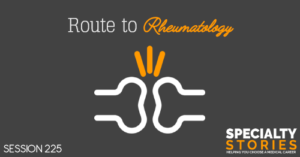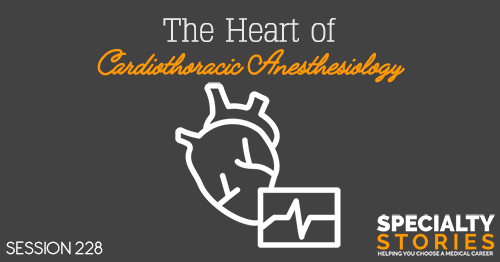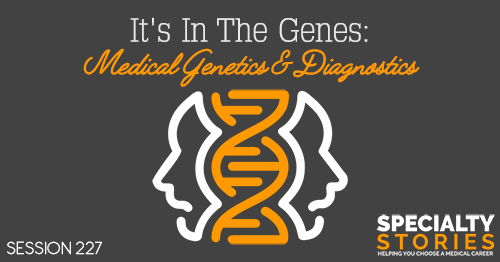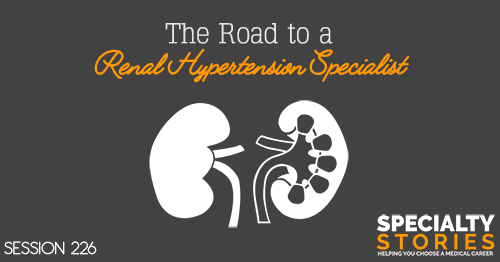Apple Podcasts | Google Podcasts
Session 225
Dr. Rosalind Ramsey-Goldman has been a Rheumatologist since 1986, and today, she spills everything on her journey and specialty. If this is something you’re interested in, check out the American College of Rheumatology.
For more podcast resources to help you with your medical school journey and beyond, check out Meded Media.
Listen to this podcast episode with the player above, or keep reading for the highlights and takeaway points.
[01:07] Interest in Becoming a Rheumatologist
Rosalind recalls becoming interested in rheumatology during her training in internal medicine. She was focusing on practicing primary care and chose internal medicine as her training path. She found herself comfortable helping women who had chronic illnesses then took an elective in rheumatology, and somehow it clicked for her.
Rosalind was seeing mostly women who had arthritis or systemic autoimmune disorders. It was very clear that they needed to have guidance in terms of how to deal with their illness and how to navigate their life with this illness. First of all, there were no cures. Secondly, because rheumatology deals with a lot of different areas these diseases can affect you, not just the joints, but any other body organ. It was a way of doing primary care but in a more focused way.
Rosalind also shares that the first patient she saw during training was a pregnant patient with lupus whose baby had a slow heartbeat. And at that time, it was a new area of research that drew her interest and set off her career.
[05:45] What is Rheumatology?
Rheumatologists specialize in taking care of arthritis, other musculoskeletal conditions, and systemic autoimmune diseases, sometimes known as collagen vascular diseases or connective tissue diseases.
In this group of diseases, a person’s immune system attacks the person’s own body. It causes inflammation where it’s not really wanted, resulting in pain and swelling, or worse, organ damage.
Rheumatologists are considered the experts in treating this group of disorders that can affect any part of the body including the joints, the muscles, and the bones. It can also affect the eyes, the skin, the kidneys, the heart, the lungs, or any internal organ..
A quick trivia, the term “rheuma” comes from a Greek word followed by a Latin word meaning flow, which refers to a condition flowing throughout the body.
You also have to be comfortable with complex illnesses and not get the right answer immediately. And because they don’t really cure anybody, they need to take time to develop trust with the individual they’re caring for.
Additionally, having great organizational skills is important since many areas could be affected. Therefore, you have to coordinate care across the specialties. Many times, they actually have to be advocates for our patients. You also have to have a sense of social justice and take the time to help get the person the care or the testing they need.
[10:58] The Biggest Myths and Misconceptions
Rosalind says that if you want to do procedures right away, then you probably won’t resonate with rheumatology. There’s a small procedure component to it like ultrasound and injections, but not for the most part.
That being said, a lot of students come in because they love the investigation part. And rheumatology might be a great specialty for someone who wants to figure out what’s going on with the patient.
[15:09] Typical Day and Week
As someone who is mostly involved in research, Rosalind has quite a typical day that is not similar to other rheumatologists in practice.
'Most rheumatologists would be seeing patients almost every day.'Click To TweetSomeone in practice is going to spend a number of hours seeing patients. But there’ll be some amount of time to do all the other work that’s needed to be sure that your patients are getting what they want.
Rosalind’s typical day, on the other hand, would be spent going to meetings with colleagues planning, organizing, or running studies. She also does a lot of writing for funding opportunities or to keep up the research that might have regulatory requirements to make sure.
Rosalind also sees patients for clinical care and research studies. Part of her practice too is helping other doctors when they have questions about the diagnosis and management of lupus or managing pregnant patients.
[18:34] Is a Ph.D. Important for Research?
Rosalind feels blessed to have found mentors who supported her in her passion for helping pregnant patients with lupus. And that led her to apply to graduate school, which gave her the time to do the coursework. She eventually got a master’s and a doctorate in public health.
Rosalind explains that while those degrees may start you off, that’s not a guarantee that you would be successful in research. You have to be persistent, tenacious, and actually have thick skin because you get turned down a lot.
'You just have to have it in you that you really want to do something, It's like your personal mission.'Click To TweetRosalind encourages students to follow what’s important to them. And if it’s meaningful and something that resonates with you and that you’re passionate about, then that would define your career.
[22:24] Should You Do the MD/Ph.D. First?
Rosalind says that if you are working in a lab and doing basic science research, you probably want to get the Ph.D. first as things move more quickly in that area. There are a lot of technical things and a way of thinking that you have to learn. You have to find your niche in terms of the technical stuff you need to know, where you’re going to develop new techniques and to make the connections.
If you’re going to be a clinical person, it’s still possible to do it backward like what Rosalind did. According to her, what contributes to her success is that her patients serve as her laboratory. And so, the things her patients need would define what she would need to do from the research standpoint.
'The idea generation and the interaction with patients actually helps you build your clinical research niche area.'Click To Tweet[24:06] Types of Procedures
As rheumatologists, they withdraw fluid from swollen joints to help with diagnosis. And if it was appropriate, they could inject a medication to try to help the inflammation. When she was training, they did it blind where they were just feeling it.
Now, with the ultrasound technique, they can see where the swelling or the fluid is located, and it helps them position the needle better. This results in a more precise injection and can also help with the diagnosis.
Rosalind illustrates a skin condition called psoriasis as an example. And if you would do this ultrasound exam of the joints, say, in the hand, the person might not really be complaining about a lot of swelling or pain in their hand or pain. Or you don’t see a whole lot of stiffness. But you could see some early signs of inflammation through this testing mechanism.
And so, this procedure could intervene earlier, rather than waiting till it was full-blown. But once the joint is damaged, or partially destroyed, they can’t fix that.
'Early diagnosis is important.... the pursuit of enhancing the procedures we used to do gives us a lot more bandwidth to make a difference.'Click To TweetRosalind adds that if you miss the opportunity to treat early, there are certain kidney problems that progress very quickly or certain types of inflammation of the spinal cord. And if you don’t fix that right away, then the person’s kidney gets destroyed, or they become paralyzed if it’s related to the spine.
Emergencies very rarely occur. She also points out the importance of working with all of your colleagues to make sure those kinds of things are recognized. All that being said, their calls are not onerous. They could have a few bad weeks here and there with sick patients at the hospital. But for most days, they don’t have to stay up all night.
[28:40] The Training Path
After four years of medical school and three years of internal medicine residency, the next step is a rheumatology fellowship. That’s a minimum of two years so you can be credentialed to sit for the boards to be a practicing rheumatologist.
If you want to do research, then you do an additional year or two to get the research credentialing. That’s to protect your time so that you can develop your research program.
The first year in rheumatology is all clinical and that counts towards your time to be able to sit for the boards for internal medicine. But then you’ve already done at least one year of your training in rheumatology. You’ve already made the decision to do research so you’re going to do at least two more years.
And so, it’s possible now that you can get to the research part of your training sooner.
[30:43] Life Outside of the Hospital
Since Rosalind’s husband is a physician too, they have made a pact that at least one of them has to be there for their children’s school or sporting events.
Although their kids are all grown up now, they used to also make sure that they took at least one family vacation. And because they were so busy during the week, they would have a night out with the family.
[31:57] Other Specialties They’re Closely Working With
Rosalind says she works closely with every specialty because any body part could be affected by their diseases. And since she focuses on lupus, it can affect any part of the body.
The people she works with the most are nephrologists because kidney involvement is the most common serious thing that lupus patients have. They also work with dermatologists, blood specialists, and neurologists.
Because of her interest in pregnancy, she also works a lot with OBs. She also has to work with other people in health care such as physical therapists, pharmacists, and mental health specialists.
“You have to have at least some working knowledge of a lot of different specialties so that you can have good conversations and coordinate care with all the people these individuals need.”Click To Tweet[34:20] What She Wished She Knew
Rosalind says she wished she knew how exciting the field was going to be, especially with the kinship that she felt. The treatment she started, for instance, has made big strides in treating rheumatoid arthritis and psoriatic arthritis.
“There are a whole host of medications that we can use that really make a huge difference in how people can function and give them back their lives.”Click To TweetRosalind reckons that lupus is the next area where they make a big breakthrough. They didn’t have a new medication for almost 50 years for lupus. And then they had their first new drug specifically designed for lupus approved in 2011. And just in the last year, they had three new approvals.
She would have had no clue about how much an impact she was going to make back when she started with that first pregnant patient during her training.
[36:17] How the World of Biologics Impacts Patients
“What's exciting about rheumatology is the discovery in the laboratory, identified areas where you could intervene, and then the drugs developed based on that.”Click To TweetRosalind recalls having had patients, mostly women, who had significant deformities of their joints. Many of them were needing surgery, but now you don’t see that anymore. She also remembers being in training and seeing an OB telling a lupus patient that she could never have a baby, even if they just had skin involvement, and no internal organ involvement.
It’s a way of thinking that it is possible to do things that you never thought that you could do. These are based on using medications, treating earlier, having the new medications, and coordinating better across all the specialties. You have to be sure that they’re taking care of the rest of the body. Even if it’s not a Lupus specific treatment.
For instance, they shouldn’t be smoking or their blood pressure needs to be controlled, or you have to help manage their weight. So, it’s a whole range of things on top of the biologics, or along with the biologics, that have made a huge difference in how people with rheumatic diseases can fare these days.
[39:01] The Most and Least Liked Things
Rosalind likes the fact that she’s able to make a difference in people’s lives and reduce their pain. She loves being able to give them back or improve their quality of life and help them attain whatever their personal goals are.
On the flip side, what she doesn’t like is that she cannot cure it. She can’t just give her patients penicillin and take away their strep throat. She can only prevent things. That being said, she also mentions that being able to set reasonable goals and benchmarks can still be satisfying.
[40:31] Major Changes Coming to the Field
When it comes to finding cures or some new ways of doing bone marrow transplants or figuring out how to kill all the bad cells like we do in cancer and let the immune system kind of reset itself, Rosalind says this could be a possibility.
One of the studies they’re doing now is using umbilical cord stem cells to treat lupus. And in that case, you don’t have to do all that chemotherapy ahead of time.
in terms of the Epstein Barr virus, she adds it is pretty ubiquitous. We could aim for a vaccine. But maybe the first step would be to see who the high-risk person is who’s had the virus, and she thinks maybe that’s where you intervene.
Rosalind thinks we have a natural experiment. The rheumatologists are all over this with the COVID-19 as well. Hopefully, we can understand what’s happening to the immune system, and if there’s got to be any silver lining with this current infection and pandemic.
Whether they’ve seen an increase in their cases in the face of the pandemic, Rosalind says there are intriguing things like blood clotting. It’s similar to the phospholipid antibody but not exactly the same. And it may be that this virus is tickling the immune system somehow and in a predisposed situation.
Sometimes, they even see antibodies, not diagnostic of lupus, because you can see that in a lot of autoimmune diseases. But Rosalind thinks maybe that’s the first antibody that gets done and that the immune system gets out of control. Then you make the other antibodies and eventually you cross the threshold to having a systemic disease.
[45:41] Final Words of Wisdom
If she had to do it all over again, Rosalind says she would still have chosen the same field. She adds that it’s a really exciting time to be a rheumatologist, especially since a lot of our medications were repurposed for COVID.
“Even though our work days might be long, it's very fulfilling because we have a significant impact on a person's care.”Click To TweetLinks:
SEARCH SITE
LISTEN FOR FREE












